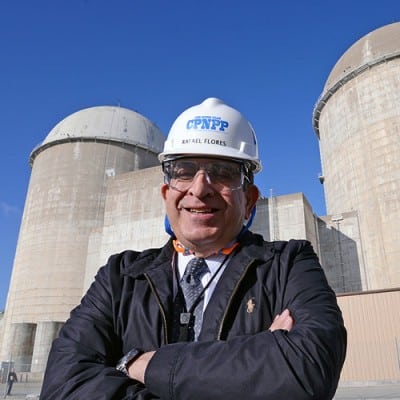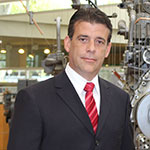In general, nuclear energy is available and accessible; it now feels common. That’s a credit to a small cadre of nuclear engineers who are anything but common. Of the 437 nuclear reactors in operation worldwide, 99 are in America. Just 26 chief nuclear officers (CNOs), run those facilities. Those 26 CNOs form a tight-knit community. But unlike many insular communities of like-minded people, the CNO community is constantly evolving. It is as dynamic and innovative as the very energy each CNO is responsible for harnessing in a safe and effective way.
Rafael Flores, chief nuclear officer for Luminant, is a member of that community. Flores, a 1979 graduate of Texas A&M, oversees the safety and operation of a two-unit nuclear power plant in Texas called Comanche Peak. Flores works with his team of vice presidents to maintain their responsibility for the operation of the plants. Safety and reliability are his number-one priorities: The state of Texas needs to be able to rely on Flores to keep the plant operating safely, and Luminant needs to be able to trust Flores to run the plant in a way that has a positive effect on their energy business.

“I have vice presidents who report to me and oversee the operation and maintenance of the plants as well as the modifications that continually add margin to the safety and reliability of the plant. It is also important to continue to look at controlling the overall cost by looking for process improvements,” Flores says. “In addition, it is important that I stay involved with the industry to ensure we, as a plant, learn all we can from our peers.”
Flores’s graduation date from Texas A&M has particular importance in his work and in his role in the industry: the 1979 Three Mile Island accident inspired the nuclear industry to launch the Institute of Nuclear Power Operations. “This is a group that oversees nuclear power in the United States and promotes excellence in operations,” he says. “It’s not just about minimum standards; they’re pushing to be operating at a much higher level.”
The entire nuclear industry funds the Institute of Nuclear Power Operations, which operates as an independent group that oversees the nuclear community. Flores’s role as a CNO involves him with the Institute. He provides advice and suggests improvements to ensure the industry’s commitment to excellence continues.
Flores is able to do that at a comprehensive level, thanks to a seminal opportunity early in his career. “When I first arrived at the Salem plant in New Jersey with PSE&G, I was very lucky to get an opportunity to get into a license program,” he says. “That gave me the chance to develop and build on my college education by learning how an actual nuclear power plant works and all that’s involved in operating one.” The 18-month course ended with Flores passing an eight-hour written exam and a plant exam run by the Nuclear Regulatory Commission to earn a license to operate that plant.
“That really grounded me at a fairly young age in fully understanding all that is involved in running a nuclear power plant,” Flores says. “The program taught me everything about how a plant works—not just the nuclear part, but the secondary side where the power is actually produced and then distributed to the grid, as well. It really helped me to grow.” Flores later earned another license to operate Comanche Peak. (Nuclear licenses are specific to the plants at which they’re issued.)
Continuing education is a theme that pervades Flores’ career. For the past 10 years, Flores has served on the Texas A&M Nuclear Engineering Advisory Council, where he takes all of his experience and education and reinvests it into the education of future CNOs.
If all of this education—of himself, the industry that surrounds him, and his future peers—seems redundant, it’s not. It reflects the scope of the responsibility that Flores maintains. “Our charter is very clear: it’s about producing a clean, safe, reliable source of power. It’s not just about meeting standards. It’s about really producing excellence and making sure we continue to earn the trust and confidence of the public so they know that we’re doing the right thing all of the time.”

